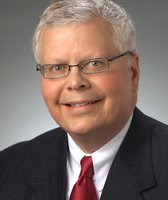Stand up for the facts!
Our only agenda is to publish the truth so you can be an informed participant in democracy.
We need your help.
I would like to contribute
SUMMARY: An anonymous e-mail says Barack Obama belongs to a racist, anti-American church. We find that the church teaches black empowerment, not racism, and that it claims Africa as its ethnic heritage. We also find, yet again, that Obama isn't Muslim.
Anonymous e-mails ricocheting around the Internet say Sen. Barack Obama shouldn't hold the presidency because the church he belongs to is anti-American and "scary."
It is not the first time Trinity United Church of Christ in Chicago has been a focal point of controversy for Obama, whose presidential aspirations soared when he won the Iowa caucuses last week. But questions about the teachings of this church, with more than 8,000 members, have risen again as e-mails hit in-boxes all over the country this week.
"If you look at the first page of their Web site," one e-mail declares "you will learn that this congregation has a nonnegotiable commitment to Africa. No where is AMERICA even mention. Notice too, what color you need to be if you should want to join Obama's church ... B-L-A-C-K!!!"
Some of the e-mails opine that the church is racist and so is Obama. A few claim that he is a covert Muslim and that his middle name is Mohammed.
Sign up for PolitiFact texts
It's the latest salvo in the e-mail wars — anonymous missives launched into cyberspace seeking to frighten voters away from presidential candidates in the guise of friendly warnings. Typically they use kernels of truth, then launch into falsehood.
"There's no question this is a distortion," said Martin Marty, a retired Chicago-based historian of religion and public life, who is white and has attended services at Trinity several times.
PolitiFact received multiple versions of the e-mail from readers asking about its veracity. Let's sort out the claims:
• Yes, Obama belongs to Trinity United Church of Christ, which is considered among the larger black megachurches in the United States. The presidential race has kept him away from the church recently, but he typically attends when he's in Chicago, according to his campaign.
• Yes, Trinity preaches a Bible-based message of black self-reliance. Its motto is "Unashamedly Black and Unapologetically Christian." And the church does have a "nonnegotiable commitment to Africa."
• No, you do not have to be black to join Trinity. The church, which has been overwhelmed with media inquiries, said in a statement that it welcomes people of all races and has white members.
• No, Obama is not Muslim. He is a Christian.
• No, Obama's middle name is not Mohammed. He is named Barack Hussein Obama after his father, a Kenyan who came to the United States from Africa as a student.
The main target of the e-mails is the church and its philosophy, formulated by senior pastor Jeremiah A. Wright Jr., a minister known for his passionate sermons and what he calls black liberation theology.
According to Obama's memoir and speeches, it was Wright's preaching that inspired him to convert from a secular agnosticism to Christianity during the 1980s. At the time, Obama was working as a community organizer in Chicago's South Side, an African-American neighborhood that includes poverty-stricken areas with pockets of affluence.
Obama borrowed the title of his book The Audacity of Hope from one of Wright's sermons. The pastor, who is expected to retire this year, built Trinity from a small number of families in 1972 to the largest congregation of the United Church of Christ, a denomination known for a diversity of views among its nearly 6,000 congregations.
Trinity's commitment to Africa appears to be more a statement of philosophical orientation than of political support for any particular African country. The church offers classes about the continent and sponsors trips there. Its Web site, www.tucc.org, says it seeks to represent the concerns of Africa in the United States and compares its allegiance with other mainstream immigrant groups:
"Just as those of Jewish heritage advocate on behalf of the state of Israel, and those of Irish heritage advocate on behalf of Ireland, and those of Polish descent for Poland, so must we of African descent care about the land of our heritage — the continent of Africa."
Dwight Hopkins, a professor of divinity at the University of Chicago who attends Trinity and is black, describes the church as "highly evangelical and Bible-based." People who don't bring a Bible to services so they can look up passages are likely to be teased good-naturedly from the pulpit, he said.
The church combines gospel singing and modern dance with Southern-style hand-shaking, hugging and kissing, Hopkins said. He said the preaching tends to be "common-sense folk wisdom laced with theological sophistication."
"There's singing and shouting and people get happy. It's an old-fashioned, mainstream down-home church that somehow is captured in this 8,000-person congregation," he said.
John C. Green, a professor of political science and a senior fellow with the Pew Forum on Religion & Public Life, said scholars do not consider black liberation theology to be racist. But it can appear that way to outsiders.
"A black empowerment theology could be seen as having a racist element because it isn't neutral in regards to race," he said. "The person who wrote this e-mail obviously has very strong feelings about this."
Obama responded to criticism about the church's tenets in a February 2007 interview with the Chicago Tribune .
"Commitment to God, black community, commitment to the black family, the black work ethic, self-discipline and self-respect," Obama said. "Those are values that the conservative movement in particular has suggested are necessary for black advancement. So I would be puzzled that they would object or quibble with the bulk of a document that basically espouses profoundly conservative values of self-reliance and self-help."
Nevertheless, Obama had invited Wright to give the invocation when he announced his candidacy for president, but rescinded the invitation at the last minute. The campaign has said that decision was made to avoid putting Trinity under a microscope.
"Senator Obama is proud of his pastor and his church," campaign spokesman Bill Burton said at the time. "But because of the type of attention it was receiving on blogs and conservative talk shows, he decided to avoid having statements and beliefs being used out of context and forcing the entire church to defend itself."
Conservatives have questioned the church's teachings and some of Wright's political opinions criticizing U.S. foreign policy. Sean Hannity ,of the Fox News show Hannity and Colmes, has criticized the church's teaching as "divisive." Wright appeared on the show in March; the two men had a spirited debate.
Michael Cromartie, vice president of the Ethics and Public Policy Center, a conservative-leaning think tank that studies the role of religion in public life, said he also thinks Wright's teachings are divisive.
"It's too strong to call it racist but at the same time, it is a form of identity politics or identity theology, which insists you white people can come to this church, but you won't get it," Cromartie said.
Trinity defended its teachings in a statement responding to the recent attacks:
"There is no anti-American sentiment in the theology or the practice of Trinity United Church of Christ. To be sure, there is prophetic preaching against oppression, racism and other evils that would deny the American ideal," it said.
Marty, the retired historian, said, "Whites are highly accepted. They don't make a fuss over you, but you're very much welcomed."
Nationwide, the United Church of Christ is predominantly white and encourages diversity and autonomy among its congregations. (It should not be confused with the Church of Christ, a denomination that is significantly more conservative.)
Voter interest in candidates' religion is high again after a period of low interest in the 1970s and 1980s, said Green of the Pew Forum on Religion & Public Life. The decades when candidates weren't critiqued for their religious beliefs might be considered the aberration rather than the norm, he said.
"This kind of highly negative portrayal of other people's churches and faiths is actually very common in American history," he said, citing as a recent example anti-Catholic invective aimed at John F. Kennedy when he ran for president in 1960.
"But we didn't have the Internet back then. This kind of communication has always gone on, but it moves much faster now."
UPDATE: Since this story was published, Rev. Jeremiah A. Wright of Trinity United Church of Christ has been criticized for remarks he made about Louis Farrakhan. For more on that controversy, see the statements we've checked here and here .
UPDATE: Barack Obama resigned from Trinity United Church of Christ on May 31, 2008, after church pastor Jeremiah A. Wright Jr. made controversial remarks about U.S. foreign policy and other matters. Obama said he intends to join another church after the election.
Our Sources
Web site for Trinity United Church of Christ
Statement from the Trinity United Church of Christ
Statement from the Barack Obama campaign
Interview with Martin E. Marty , retired historian
Interview with Dwight Hopkins of the University of Chicago
Interview with Michael Cromartie, vice president of the Ethics and Public Policy Center
Interview with John C. Green of the Pew Forum on Religion & Public Life
Hannity & Colmes, Obama's Pastor: Rev. Jeremiah Wright , March 2, 2007
New York Times, A candidate, his minister and a search for faith , April 30, 2007
Associated Press, Obama's activist church enters spotlight , March 20, 2007
New York Times, Disinvitation by Obama Is Criticized , March 6, 2007
Chicago Tribune, Pastor inspires "audacity to hope" , Jan. 21, 2007
Barack Obama Senate office, Call to Renewal Keynote Address , June 28, 2006
Barack Obama speech, A Politics of Conscience , June 23, 2007
Read the full text of the anonymous e-mail here .





















































